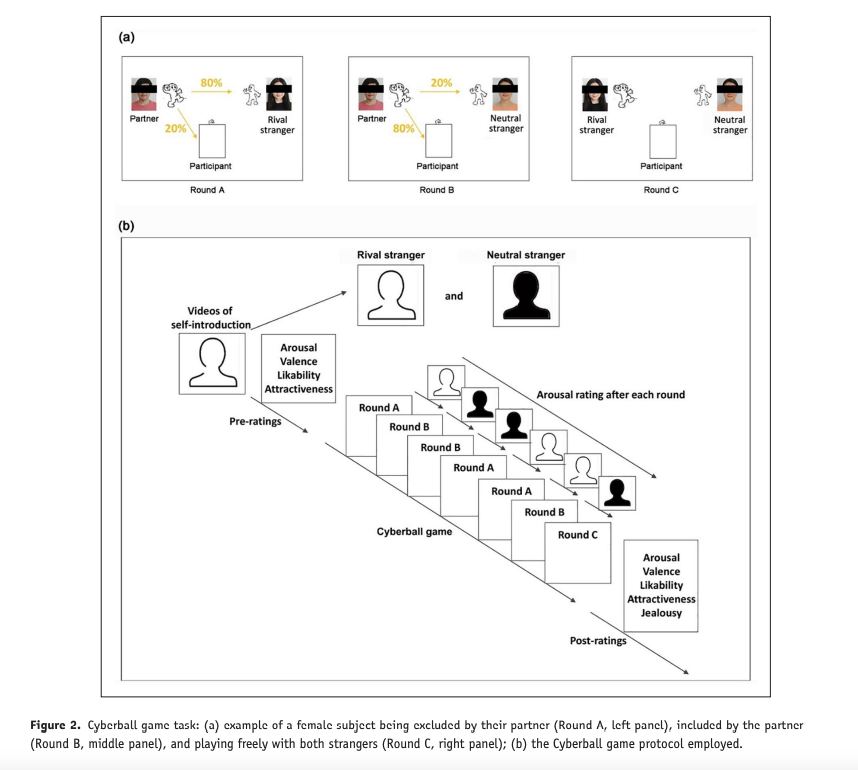Jealous in your relationship? A dose of oxytocin may keep you level-headed

- Although the neuropeptide oxytocin is known to strengthen social bonds, few studies have explored its potential effects on romantic jealousy.
- A study involving couples in intimate relationships tested whether oxytocin could reduce feelings of arousal and jealousy during experiments that evoked jealousy among the participants.
- The results suggest that oxytocin does reduce feelings of romantic jealousy and that the hormone might someday help treat people with pathological jealousy.
In Shakespeare’s Othello, the antagonist Iago warns the titular character to beware of jealousy, the “green-eyed monster” that mocks the victims it devours. Othello does not listen. After he grows suspicious that his wife Desdemona is having an affair (she wasn’t), Othello becomes overcome with jealousy and kills her, and then himself.
It is because of Othello that we now associate the color green with jealousy. The play also inspired the name of Othello syndrome, which describes a state of paranoid delusional jealousy in which someone is absolutely convinced of the infidelity of their partner. Although the syndrome is rare, jealousy is not — especially within romantic relationships.
Psychologists consider jealousy to be a social emotion that is both complex and compound, meaning it often comprises a mix of other common emotions: anger, fear, sadness, and surprise. Like all negative emotions, jealousy sometimes has its place; mild amounts seem to benefit romantic relationships by stoking passion. In extreme amounts, however, jealousy can erode relationships and contribute to domestic abuse, even murder.
What if messenger molecules could help us pump the brakes on romantic jealousy? That was one of the key questions behind a study recently published in the Journal of Psychopharmacology, which tested whether the neuropeptide oxytocin can enhance social bonds and reduce conflicts between romantic partners.
The results suggest that intranasally administered oxytocin can reduce feelings of romantic jealousy in both men and women, and that oxytocin might someday be used as a therapeutic for people suffering from extreme, pathological forms of jealousy.
Cyberball and a simulated love triangle
The study involved 70 heterosexual couples in intimate relationships that had existed for at least six months. Participants were divided into two groups: One received a placebo while the other received an intranasal dose of oxytocin, which is a hormone produced in the hypothalamus. Oxytocin is often called the “love hormone” because it helps strengthen social bonds, its levels increasing when people do things like fall in love, have sex, interact lovingly with pets, sing in groups, and give birth.
All participants then completed two tasks. In one, each participant was asked to imagine their partner engaging in acts of sexual or emotional infidelity, and then rate the extent to which they felt various emotions and states, including arousal and jealousy.
In the second task, groups of three participants played a game called Cyberball, a computer game in which players toss a ball to each other. The game is frequently used in studies on social exclusion because it is easy to measure precisely the amount of interaction each player gives and receives. This study used a modified version of Cyberball. Each participant thought they were playing against their partner and a randomly assigned participant. In reality, the game was actually rigged by a computer. What’s more, the third participant in each game was specifically chosen by the researchers to serve as an attractive same-sex rival; before the game, each participant was shown a video of the person they would be playing with.
To evoke jealousy, the researchers rigged the game so that all players received an equal amount of tosses at first, but then the computer switched to a pattern where each participant’s partner “chose” to toss the ball to the attractive stranger far more frequently. Afterward, the participants again reported how strongly they felt certain emotions and states, including arousal and jealousy.

The results showed significant reductions in jealousy among participants who had received oxytocin prior to the two tasks. The findings generally align with prior research showing that oxytocin seems to reduce conflicts between couples, potentially because it reduces activity in the anterior cingulate cortex, a region of the brain that is believed to be key to monitoring emotional ambivalence and social rejection.
But the recent study offers “the first direct evidence for [oxytocin] reducing feelings of jealousy in both imagined and real contexts in male and female romantic partners,” the researchers noted.
“Feelings of jealousy and associated arousal were reduced by OXT treatment across different imaginary scenarios. In the Cyberball paradigm used to provoke real jealousy responses, subjects under OXT reported reduced jealousy and arousal towards the rival strangers as well as reduced intensity of negative feelings associated with jealousy during the game. These findings therefore provide further support for a role of OXT in helping to maintain romantic bonds through increasing greater tolerance of partners interacting closely and even intimately with others.”
The study had a few key limitations. All participants were college students, so there may be some age-dependent effects on romantic jealousy that are uncommon in other age groups. The researchers also didn’t account for participants’ past experiences with infidelity. And perhaps most importantly, the study only measured imagined and evoked infidelity; it is entirely possible that oxytocin would have weaker effects during a real-life encounter with infidelity.
But limitations aside, the results suggest that oxytocin is worth investigating as a treatment for pathological jealousy, which is believed to affect about 0.5% to 1% of the population.





